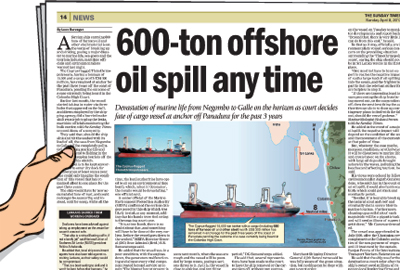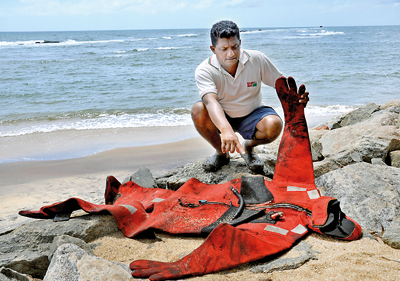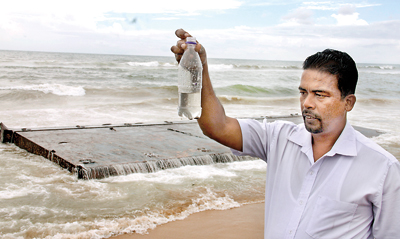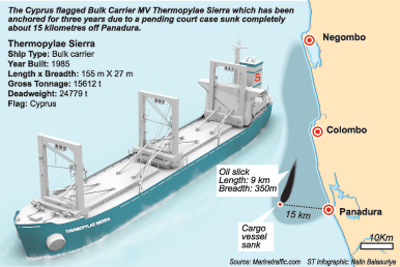News
Environmental concerns mount as oil slick spreads
The authorities have launched a round the clock monitoring system of an oil slick that surfaced on the ocean from a cargo vessel that sank off the Panadura coast late Thursday while marine biologists and environmentalists warned of a catastrophe when the oil slick reaches the shore.

We warned the authorities, The Sunday Times April 8, 2012
According to officials the 15,500 tonne Cyprus-flagged Thermopylae Sierro took in water and sank some three nautical miles off the Panadura coast with some 30 tons of furnace oil and an estimated US$300 million cargo of pure steel material.
The vessel had been in anchorage since 2007 awaiting the outcome of a court battle where some nine cases had been filed against the vessel’s owning company regarding default in payments, etc.
Latest reports according to officials is that the oil slick, some 10 kilometres in length, was heading in a westerly direction towards the deep sea but could change course at any time depending on the weather pattern.
Director General Marine Environment Protection Authority (MEPA), Rear Admiral (Retd.) S.R. Samaratunga told the Sunday Times that the slick was being closely monitored by several state agencies and that precautions had already been set up in case the oil spill should head for the shore line.
He added that the port authorities were ready with floating barriers to prevent the oil from entering the harbour area where several ships are anchored.
He further cautioned that the vessel could break up should rough seas that are expected with the South West Monsoon bang the ship on a rocky surface. “If that should be the case one could expect a larger spill of the oil,” he added.
Merchant Shipping Director General Ajith Senivaratne said there was minimum danger of the slick heading towards the shore line, although some traces of oil been discovered on the Negombo beach.
“We cannot be certain if the findings on the Negombo beach were from the sunken vessel but investigations are continuing. At present we know that the slick is moving away from the country’s territorial waters and that is good news for the moment,” he said.
He added that the vessel was earlier loaded with 600 tonnes of furnace oil but at the time it went down there was about 30 to 40 tonnes since much of the oil was removed last month.
He added that steps were underway to file legal action against the ship owner who will also be asked to meet the expenses that will be incurred for clearing up operations and damages caused.
Meanwhile a task force comprising police and security forces along with volunteers from different institutes and organisations are on stand by to combat any environmental threat from the oil slick, Disaster Management Centre (DMC) Deputy Director Pradeep Kodippili said.
“Even though the slick is reported to be drifting further into the deep sea and away from the country one cannot relax because the weather at this time of the year is unpredictable and it could determine the course of the floating oil patch,” he said.
Earlier environmentalists had pointed out that the vessel should not have been in that location in the first place, court battle or not and blamed relevant authorities for dragging their feet on the matter for too long.
Marine biologists Nishan Perera was quoted as saying that oil spills of any magnitude could only spell disaster for marine life while creating havoc on the shores.Fellow Marine Biologist Dr. Malik Fernando disputed the claim by the authorities that the present current pattern in the sea was towards the west.
“During this time of the year the current pattern is north and therefore it is most likely that the oil slick will reach as far as Negombo among other places,” he said. “Furthermore, irrespective where the oil slick is presently drifting- whether it is the deep sea or closer to the shore it will no doubt have an adverse affect on fishing activities,” Dr. Fernando added.
His views were also echoed by fellow environmentalist Jagath Gunawardene who said that there was the threat of diving sea birds being coated by the oil, something that could prove lethal.The vessel was arrested in 2007 after the Ukranian crew complained to authorities in Colombo of the non-payment of wages and poor working conditions on board the vessel, Ranjan Perera with the International Transport workers Federation (ITF) said.
He added that the vessel was further detained on another court order after the ship’s owner was in the red to the tune of millions of rupees with local bunkering and related maritime firms.In addition there was a mixed bag of cases against the vessel owner who opted to remain overseas and hired local lawyers to look after his interest in court.
“This man was not bothered of an eventual environmental fall out simply because he was a foreigner and the ship was in the waters of another country,” he charged. The authorities must not relax and seek to take fullest action against this person even in an international tribunal,” Mr. Perera added.
Seafarers warned
Meanwhile, seamen were strongly advised against taking up employment on the vessel because it was not safe as the ship was likely to go down at any moment, President of the National Union of Seafarers Sri Lanka (NUSS) Palitha Athukorale said.
He added that the ship owner operating through a local agent had made several attempts to recruit local seamen but they had advised the men against taking up the offer.
“On one occasion the authorities had landed some six hands on board the ship but they fled the vessel after two nights saying it was a ‘floating coffin’ ready to break in two,” Mr. Athukorale said.
 An oil-soaked diver’s kit washed ashore on the Negobom beach yesterday. Pic by Susantha Liyanawatte |
 Oil clots formed by mixing of oil and salt water were found in Mount Lavinia. Pic by M.D. Nissanka |
 A Marine scientist testing the sea water in Bambalapitiya. On the background is a piece from the broken ship. Pic by Indika Handuwala |
 |
Follow @timesonlinelk
comments powered by Disqus



















